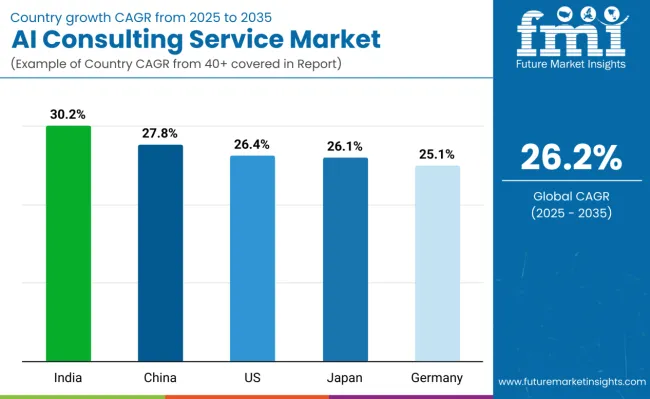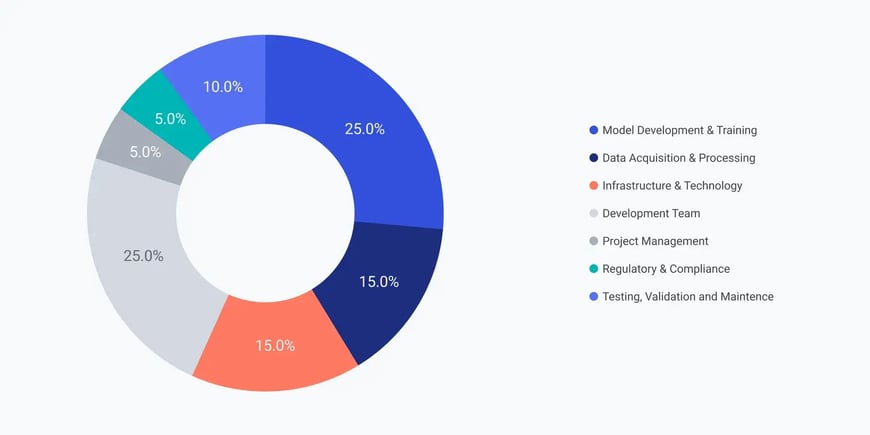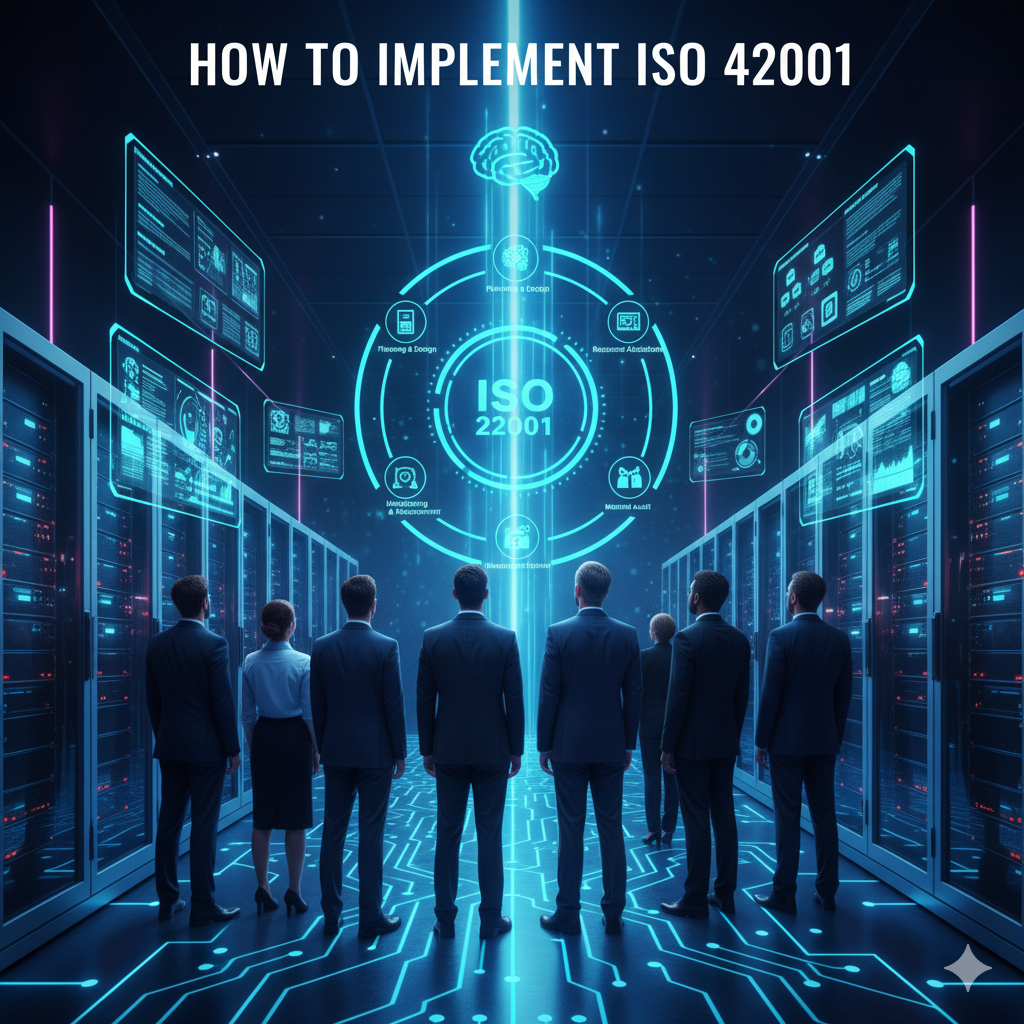Artificial intelligence is transforming how companies operate, but most organizations lack the expertise to implement AI systems effectively. The complexity of AI technology, combined with the need for strategic planning and organizational change, creates significant challenges for businesses attempting to adopt AI independently. Many companies struggle with questions about which AI solutions to pursue, how to prepare their data, and how to manage the risks associated with AI deployment.
AI consulting has emerged as a critical service that bridges the gap between AI technology potential and practical business implementation. Professional consulting firms now offer specialized expertise to guide organizations through every stage of AI adoption, from initial strategy development to full-scale deployment and ongoing management. The global AI consulting market is projected to grow from $11.07 billion in 2025 to $90.99 billion by 2035, reflecting the enormous demand for expert guidance in AI implementation.

The field encompasses far more than basic technology installation. AI consulting addresses complex challenges related to data governance, regulatory compliance, organizational change management, and long-term strategic planning. Successful AI adoption requires coordination across multiple business functions and careful attention to both technical and human factors that determine implementation success.
What AI Consulting Provides
AI consulting combines strategic planning, technical implementation, and organizational change services to help companies adopt artificial intelligence effectively. Consultants begin by assessing current organizational capabilities, data infrastructure, and business processes to identify promising opportunities for AI application.
The consulting process addresses several key areas:
- Strategy development — Aligning AI initiatives with business objectives and competitive positioning requirements
- Technical implementation — Integrating AI systems with existing enterprise infrastructure and data pipelines
- Change management — Helping organizations adapt their processes and workforce to incorporate AI capabilities
- Risk mitigation — Establishing governance frameworks for data privacy, security, and regulatory compliance
Research from Boston Consulting Group indicates that approximately 70 percent of AI implementation effort relates to people and processes, with only 30 percent focused on technology and algorithms. This distribution explains why successful AI adoption requires comprehensive consulting support beyond technical installation.
Types of AI Consulting Services
AI Strategy and Assessment Services
AI readiness assessment evaluates an organization’s current capabilities to determine preparation for artificial intelligence adoption. Consultants examine existing technology infrastructure, data quality, workforce skills, and organizational processes to identify gaps between current state and AI requirements.
Strategy development creates roadmaps for AI implementation based on assessment findings. Consultants work with leadership teams to identify high-value use cases that align with business objectives. They prioritize initiatives based on potential impact, feasibility, and available resources while establishing timelines and success metrics.
Custom AI Development and Integration
Custom AI solution design creates artificial intelligence systems tailored to specific business problems. Consultants define requirements, select appropriate AI technologies, and architect solutions that integrate with existing systems. The design process considers scalability, performance requirements, and maintenance needs.
Technology implementation involves building, testing, and deploying AI models and applications. Consultants handle data preparation, algorithm selection, model training, and performance optimization. They create user interfaces and integration points that connect AI capabilities with business workflows.
Change Management and Training
Change management addresses organizational adjustments required for successful AI adoption. Consultants help leaders communicate AI initiatives, address employee concerns, and modify workflows to incorporate AI capabilities. They develop plans for managing resistance and building support throughout the organization.
Team training provides employees with skills needed to work effectively with AI systems. Training programs target different audiences including executives, managers, and end users, covering AI concepts, tool usage, and new processes.
How AI Consulting Works

Discovery and Assessment Phase
The discovery phase begins with comprehensive evaluation of current business processes, technology infrastructure, and organizational readiness for AI adoption. Consultants conduct stakeholder interviews across departments to understand existing workflows, pain points, and strategic priorities.
Technical assessments examine existing IT systems, cloud infrastructure, and integration capabilities. Consultants evaluate whether current technology can support AI workloads or requires upgrades. They also review security protocols, compliance requirements, and regulatory constraints that may affect AI implementation.
Strategy Development and Planning
Strategy development transforms assessment findings into actionable AI adoption plans. Consultants work with leadership teams to identify high-value use cases that align with business objectives and organizational capabilities. They prioritize initiatives based on implementation complexity, resource requirements, and expected business impact.
Roadmap creation establishes implementation phases, timelines, and resource allocation plans. Consultants develop detailed project plans that sequence AI initiatives to build capabilities progressively while delivering measurable value at each stage.
Implementation and Testing
Implementation begins with data preparation and infrastructure setup to support AI system development. Consultants work with technical teams to build data pipelines, establish model training environments, and develop AI applications according to roadmap specifications.
Testing protocols validate AI system performance against functional requirements and business objectives. Consultants conduct extensive testing to ensure accuracy, reliability, and integration compatibility before moving to production environments.
Deployment and Optimization
Full deployment involves rolling out AI systems to production environments and training end users on new workflows and capabilities. Consultants provide technical support during the transition period to address integration issues and user questions.
Performance optimization continues throughout the deployment period as consultants analyze system behavior and user feedback to identify improvement opportunities. They make algorithm adjustments, workflow refinements, and integration enhancements that increase AI effectiveness.
Benefits of AI Consulting
Accelerated Implementation
AI consultants help organizations implement artificial intelligence solutions faster than internal development teams. Building AI capabilities internally requires months or years to recruit talent, develop expertise, and create implementation frameworks. Consulting firms bring established methodologies and experienced teams that can begin delivering value immediately.
External AI experts understand which AI technologies work best for specific industries and use cases. They can identify high-value opportunities quickly and prioritize implementations based on business impact rather than technical novelty.
Risk Mitigation and Compliance
AI implementations create new categories of operational, reputational, and regulatory risks that organizations must manage carefully. Consulting firms provide expertise in AI governance frameworks that address algorithmic fairness, bias mitigation, data privacy, and decision-making transparency.
Regulatory requirements for AI systems continue to evolve rapidly across different jurisdictions. The EU AI Act, GDPR, and other frameworks impose strict guidelines on how AI systems collect, process, and store data. AI consultants stay current with changing regulations and help organizations maintain compliance.
Access to Specialized Expertise
AI implementation requires specialized knowledge across multiple technical domains including data science, machine learning, system integration, and business strategy. The talent shortage in AI means most organizations cannot recruit all the necessary expertise internally.
Data quality and preparation represent major technical barriers that require specific expertise. AI systems require high-quality, well-structured data to function effectively, but many organizations discover their existing data infrastructure is inadequate.
How to Choose an AI Consulting Partner

Evaluating Technical Expertise
Technical expertise evaluation begins with examining the consulting team’s hands-on experience with AI technologies relevant to your specific use cases. Consultants working on natural language processing projects require different skills than those implementing computer vision or predictive analytics systems.
Industry experience significantly impacts implementation success because AI applications vary dramatically across sectors. Healthcare AI projects face regulatory requirements that differ entirely from retail recommendation systems or manufacturing predictive maintenance applications.
Assessing Implementation Methodology
Implementation methodology assessment focuses on the consulting firm’s structured approach to AI project management and delivery. Established frameworks provide systematic approaches to AI development, ensuring projects progress through defined phases including business understanding, data preparation, modeling, evaluation, and deployment.
The methodology evaluation includes examining change management processes that address organizational transformation alongside technical implementation. AI projects require workforce training, process redesign, and cultural adaptation that technical implementation alone cannot achieve.
Security and Compliance Standards
Security standards verification begins with examining the consulting firm’s data handling policies and infrastructure security measures. Enterprise AI projects involve sensitive business data that requires protection throughout the consulting engagement.
Compliance framework assessment addresses regulatory requirements that affect AI implementations in your industry and geographic regions. Consulting firms must demonstrate knowledge of these requirements and proven approaches for building compliant AI solutions.
AI Consulting Costs and Investment Planning
Factors Affecting Pricing
AI consulting pricing reflects multiple variables that consulting firms evaluate when determining project costs:
- Project complexity — Custom machine learning models cost more than implementing existing AI tools
- Consulting firm tier — Major firms charge higher rates than boutique specialists
- Project duration — Longer engagements often receive discounted hourly rates
- Required expertise level — Specialized skills in computer vision or natural language processing command premium pricing
- Data complexity — Projects involving complex data integration increase consulting costs
Timeline for Return on Investment
AI consulting investments typically show returns across different timeframes depending on project type and organizational factors. Quick wins appear within three to six months for straightforward implementations like chatbots or basic process automation.
Medium-term returns emerge within six to 18 months for more complex implementations including predictive analytics or recommendation systems. Long-term strategic benefits develop over 18 to 36 months for comprehensive AI transformations involving custom machine learning models.
Budget Planning Considerations

Consulting fees typically represent 30 to 50 percent of total AI project costs. Strategy and assessment phases often cost $50,000 to $200,000 for mid-market companies, while full implementation projects range from $200,000 to $2 million depending on scope.
Technology costs include software licenses, cloud computing resources, and hardware requirements. Internal resource allocation requires dedicated staff time from business users, IT teams, and data analysts during active implementation phases.
Common AI Consulting Challenges
Integration Complexity

Integration with legacy systems represents a primary challenge in AI implementations. Existing enterprise systems often lack the APIs or data formats required for seamless AI integration. Consultants must develop custom integration solutions that bridge gaps between modern AI platforms and older business systems.
Data preparation work often exceeds initial estimates, with organizations typically spending 60 to 80 percent of AI project time on data-related tasks. This includes data cleaning, integration, and governance framework development that must occur before AI implementation can proceed.
Organizational Resistance
Workforce concerns about AI adoption can create significant implementation barriers. Employees may fear job displacement or struggle to adapt to AI-augmented workflows. Consultants address these concerns through comprehensive change management programs and training initiatives.
Cultural adaptation requires time and sustained leadership commitment. Organizations with strong change management capabilities see faster AI adoption than those requiring extensive foundational work in organizational readiness.
Frequently Asked Questions
What credentials should an AI consultant have for healthcare implementations?
AI consultants working in healthcare should hold relevant certifications in HIPAA compliance, healthcare data management, and medical AI applications. They need experience with FDA regulatory requirements for medical AI devices and understanding of clinical workflows. Look for consultants with healthcare industry experience and familiarity with electronic health record systems.
How do consulting firms handle intellectual property during AI development projects?
Most consulting firms establish clear intellectual property agreements before beginning AI development work. Standard arrangements include client ownership of custom AI models and business logic, while consulting firms retain rights to general methodologies and frameworks. Review IP clauses carefully to ensure your organization retains ownership of valuable AI assets developed during the engagement.
What happens if an AI implementation project fails to meet performance targets?
Reputable consulting firms establish clear success metrics and remediation procedures before beginning implementation work. Many firms offer performance guarantees or risk-sharing arrangements where consulting fees are tied to achieving specific outcomes. Discuss contingency plans, additional support options, and cost allocation for performance improvements during contract negotiations.
How long does it typically take to see measurable results from AI consulting engagements?
Initial results from AI pilot projects often appear within three to six months for straightforward applications like automated data processing or simple recommendation systems. More complex implementations involving custom machine learning models or enterprise-wide process changes typically require six to 18 months before delivering measurable business impact. Timeline depends on organizational readiness, data quality, and implementation scope.
Can small businesses benefit from AI consulting services designed for enterprise clients?
Many AI consulting firms offer scaled services specifically designed for small and medium businesses with limited budgets and resources. These engagements often focus on identifying cost-effective AI applications using existing platforms rather than custom development. Common starting points include customer service automation, inventory optimization, or marketing analytics that provide measurable returns without requiring massive technology investments.


